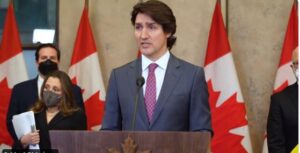Emergencies Act: Conservatives divided

TORONTO – Justin Trudeau’s decision to invoke the Emergency Act continues to cause controversy. And among the unpredictable effects of the prime minister’s decision-making turn, we also find yet another split in the Canadian right, which still continues to pay pledge to the rubble left by former leader Erin O’Toole. The emergency legislation, which is immediately applicable but must be confirmed by Parliament within seven days, guarantees greater power of intervention by the federal police and allows the current accounts of the protest financiers to be frozen.
Today, during the umpteenth agitated day, the news of the resignation presented by the Ottawa police chief Peter Sloly also arrived, accused by many parties of having held a too soft and complacent attitude towards the protesters who have been occupying the center of the capital for 18 days. But a further obvious consequence of Trudeau’s move is to lay bare, once again, the divisions that run through the conservative Canadian galaxy. Pierre Poilievre, who in recent days has flirted with the organizers of the so-called Freedom Connvoy, being photographed together with truck drivers in front of the House of Commons and defending them on several occasions.
The candidate for the leadership of the Conservative Party therefore judges positively what the protesters have done and at the same time condemned Trudeau for the decision to apply the Emergency Act. The position of Ontario Premier Doug Ford, another leading exponent of the Canadian right, is different.
Ford has publicly condemned what protesters have done – especially for the blockade organized at Ambassador Bridge and the occupation in the capital – and welcomed Trudeau’s emergency legislation. Another prominent conservative prime minister, Jason Kenney, harshly attacked the truckers’ protest but, at the same time, called the prime minister’s decision to enforce emergency laws a mistake.
Candice Bergen, interim leader of the Conservative Party, has instead chosen to position herself halfway. “Conservatives want these blockades to end quickly and peacefully. My concern is that the Prime Minister’s actions will have the opposite effect. We have learned that the Prime Minister has invoked the Emergencies Act. Our Conservative caucus will look into the details before deciding how we vote. Many provinces are opposed to this to we have seen as Justin Trudeau works. He divides, stigmatizes and wedges people who disagree with him.”
In short, four diametrically opposed positions, a litmus test of a movement crossed by deep divisions. The government will now have to bring the emergency legislation to the House of Commons and the Senate, to get the parliamentary green light as required by law within the next seven days. The Emergencies Act will remain in force only for thirty days, with the possibility, however, of being repeated.


